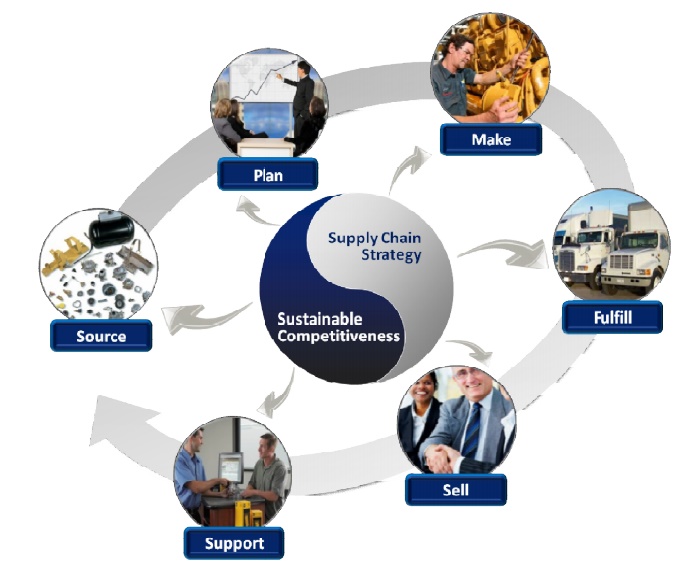Chapter: Business Science : International Business Management : Production, Marketing, Financial and Human Resource Management of Global Business
Global Supply Chain Issues
GLOBAL SUPPLY CHAIN ISSUES:
Supply
chain management (SCM) is "the systemic, strategic coordination of the
traditional business functions and the tactics across these business functions
within a particular company and across businesses within the supply chain, for
the purposes of improving the long term performance of the individual companies
and the supply chain as a whole." It has also been defined as the
"design, planning, execution, control, and monitoring of supply chain
activities with the objective of creating net value, building a competitive
infrastructure, leveraging worldwide logistics, synchronizing supply with
demand and measuring performance globally."
Main
functions of Supply Chain Management are as follows:
Inventory
Management
Distribution
Management Channel Management
Payment
Management Financial Management Supplier Management
Transportation
Management
Customer
Service Management
GLOBAL SUPPLY CHAIN MANAGEMENT:

Through
every phase of a product’s lifestyle, global supply chain management
professiona ls ensure that customers get the products and s ervices they need
and want faster, better a nd more cost-effectively from across town or around
the world. They play a critical role to the successful functioning of
businesses, healthcare, nonprofit agencies and governments.
A
"supply chain" refers t o the collection of steps that a company
takes to transform raw material components into a final product that is
delivered to customers. Typically, supply
chain
management has fi ve stages: plan, make, source, deliver and return .
Every
stage of that proc ess involves professional skills that are critical to
success, from marketing and logistics t o data management and warehousing.
Our GSCM
graduates find a wealth of different career tracks that offer both financial
rewards
and personal satisfaction.
Every
successful organization owes some of its success to effective supply ch ain
management and logistics.
These
processes focus on the flow of goods and information from the source of raw
materials through the distribution channels to the final consumer, and beyond,
to recycling and disposal.
In
today's competitive environment, managing transportation, inventory, product
plans and schedules, and information flows are critical to satisfying customers
and creating competitive advantages.
Organizations
compete globally by working with international suppliers, outsourcing, and
marketing to consumers worldwide. This global reality places even more
importance on successful supply chain management.
The
global supply chain management major focuses on global business and prepares
students for success. And with the flexibility of multiple campuses and online
courses, you can personally tailor your educational experience.
Courses
provide insight into many subjects, including:
Managing
raw materials and finished products
Developing
transportation and logistics strategies
Merging
transportation policies with production and marketing plans Global supply chain
analysis and planning
MANAGING GLOBAL SUPPLY CHAIN:
Globalization
is one of those politically charged words that often imply more than it
actually means. From the relatively benign “the world is flat” philosophy that
suggests offshore factories help stimulate U.S. imports, to the “off shoring
costs American jobs” idea that everything can and should be made in the United
States, everybody in manufacturing has an opinion on whether globalization is
good or bad for their companies and/or their fellow citizens.
Some
might suggest, in fact, that globalization is a fait accompli. As Daniel
Ackerson, chairman and CEO of General Motors Co. (IW 500/4) pointed out at a
news conference in 2011, seven out of 10 of all GM vehicles are made outside
the United States, and the trend shows no signs of stopping.
There’s
nothing very new about globalization, though, a concept that basically refers
to the practice of sourcing, manufacturing, transporting and distributing
products outside of your native country. Its modern application predates the
rise of the Internet by a good 40 years, beginning in the early 1950s when
container shipping was introduced, making it possible to quickly, efficiently
and economically move entire container loads onto ocean vessels at ports of
call throughout the world.
As the
world has gotten flatter and supply chains have gotten longer, the need for
companies to follow best practices in global supply chain management has
intensified. Gary Miller has a deep familiarity with such a role, having spent
40 years as vice president, global supply chain and chief procurement officer
with $23 billion tire manufacturer Goodyear Tire and Rubber Co. (IW 500/54)
before taking on the same role in 2008 at A. Schulman Inc. (IW 500/343), a $2.5
billion plastics manufacturer. As Miller explains it, he’s responsible for
Schulman’s supply chain and procurement activities to better leverage its
worldwide purchasing power, reduce materials inventories, eliminate waste and
improve efficiency. The company has 35 facilities globally, with nearly 70% of
its revenues derived out of the European market.
“We have
global customers that we service around the world,” he says. “Europe is a very
large region for us, so we have deep relationships with our customers there. As
those customers expand around the world, they’re also looking for us to come
with them.”
Related Topics